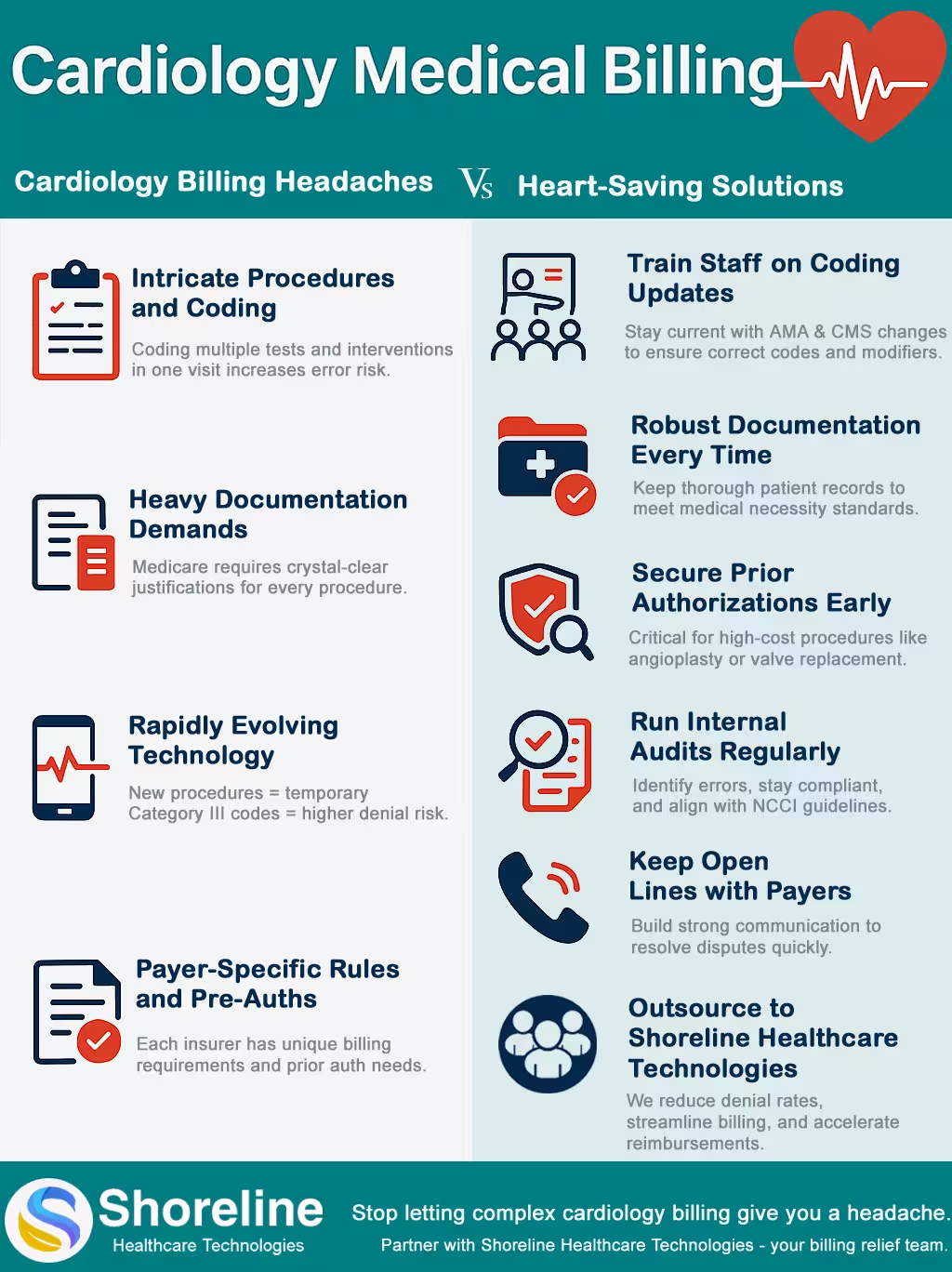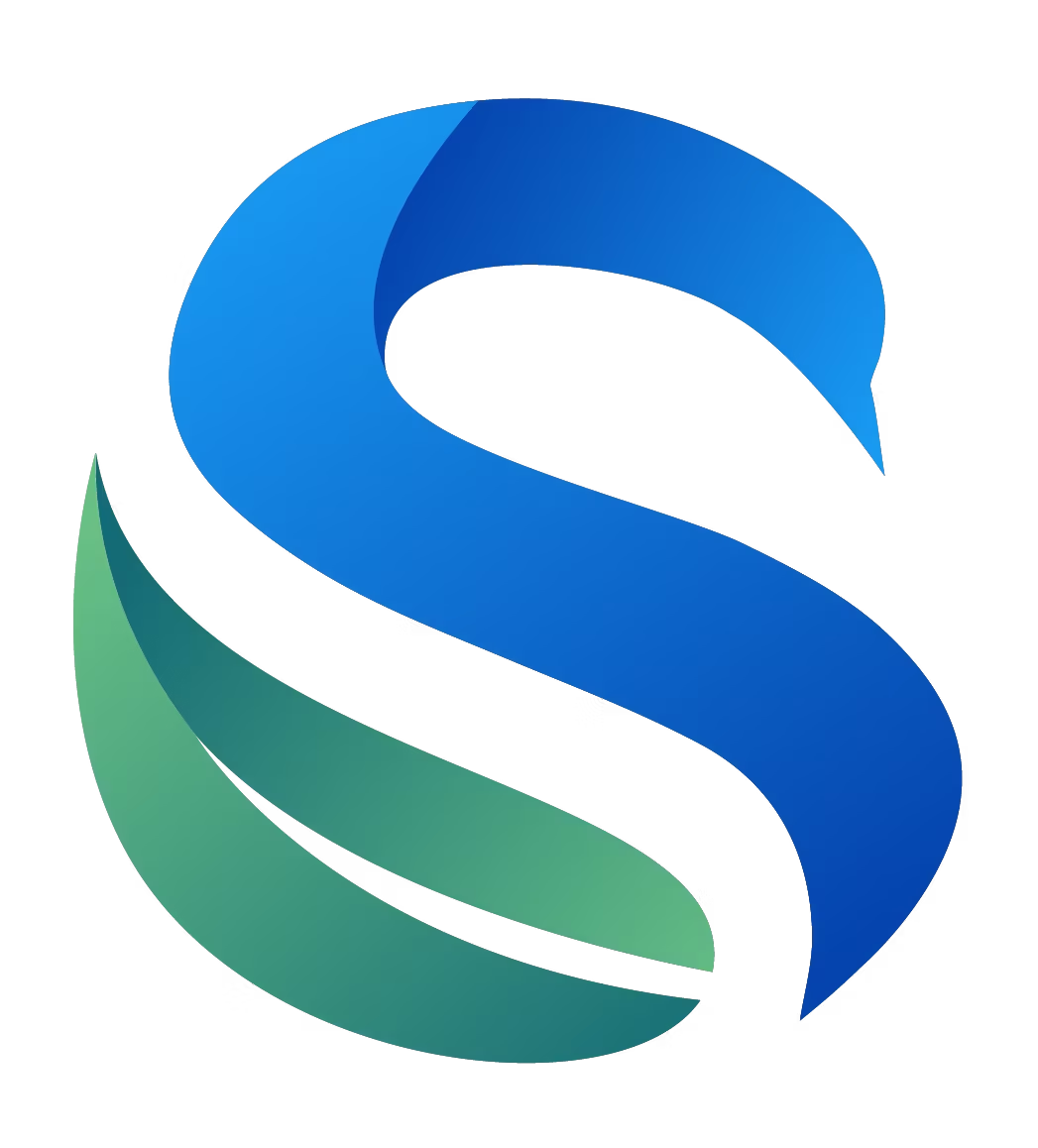Cardiology Medical Billing: Don't Let Complex Claims Give You Heartburn
Providing Cardiology medical billing services is a great challenge, from billing for echocardiograms and stress tests to ablations and heart catheterizations, each service must be precisely coded and meticulously documented to meet the expectations of the payers. But with ever-changing CPT codes, CMS updates, and payer-specific rules, cardiology medical billing often faces surge in claim denials, delays in reimbursements, and underpayments.
We at Shoreline Healthcare Technologies, understand the complexities of cardiology billing and coding and offer tailored solutions to ensure clean claims and optimize your revenue cycle. This blog post will explore the importance of accurate cardiology medical billing, challenges involved, effective strategies with technological advancements, and recent updates in the industry related to cardiology billing.

What Makes Cardiology Medical Billing So difficult?
Cardiology billing goes beyond routine procedures it covers high-cost services and diagnostics that needs a detailed and clear documentation. With the evolving payer-specific rules, and vast set of intricate CPT coding and modifiers handling cardiology medical billing services has become more complex.
- Intricate Procedures and Coding: A single patient encounter may involve coding for various diagnostic tests, interventional procedures and follow-up care. Misunderstanding the bundling rules or using an incorrect modifier can lead to immediate denials.
- Documentation Demands: Payers like Medicare, demand meticulous documentation to establish medical necessity. Without clear, detailed reports justifying every test and procedure, and getting a clean claim has become impossible.
- Rapidly Evolving Technology: As new medical procedures and devices are introduced, billers are forced to use the temporary Category III codes, which are more likely to be closely reviewed or denied by insurers.
- Payer-Specific Policies: Insurance Companies have their own specific requirements and prior authorization needs. Getting them correct is crucial.
How can cardiology practices improve their billing accuracy?
Providing rigorous training to the staffs, detailed medical records, getting pre-authorizations for complex procedures, regular internal audits, and following payer specific guidelines can help providers to improve the accuracy of billing process.
- Training the Staffs on coding updates from the AMA and CMS ensures that coders use the relevant, most specific codes and modifiers. By correctly using the bundled codes and modifiers we can get the maximum compensation for all services rendered without any hassle.
- Robust Documentation is the backbone of clean claims. Cardiologists must maintain a detail record of their patient histories, physical examinations done, diagnostic test results, procedures performed and treatment plans.
- Obtaining prior authorization from payers is most essential step in cardiology billing services because of the high-cost involved in procedures like angioplasties or valve replacements. This ensures that the services are covered by insurance companies, reducing the financial burden on patients.
- Regular Internal Audits identifies errors before claims are submitted. It helps to keep track on the changing regulatory guidelines and reduces the risk of payer audits. It also helps to check and confirm the National Correct Coding Initiative (NCCI) guidelines.
- Open communication with Payers fosters positive relationship and facilitates quicker resolution of billing disputes.
- We at Shoreline Healthcare Technologies offers expert denial management and coding services. Our team streamlines claims submission and follows up diligently, reducing denial rates and accelerating reimbursements.
Recent Updates in Cardiology Billing
Telehealth Services
- New CPT code range 98000-98003 are introduced for audio-video call for 15 minutes.
- New CPT Code 98008 is used for audio-only consultations, such as a brief phone call.
- These codes can be used for providing telehealth services. It should have clear mentioning the type of service, patient's location, and medical decision-made.
Emerging Technologies
New Category III codes are introduced for procedures like TAVR (Transcatheter Aortic Valve Replacement) and robotic-assisted cardiac surgery. These temporary codes are vital for tracking the usage and outcomes of new treatments, so that they can be permanently added to Category I CPT codes.
Cardiac Contractility Modulation Systems
Permanent CPT codes were established for procedures involving these systems, reflecting their increased use in managing heart failure.
Medicare Physician Fee Schedule (PFS) Adjustments
The CMS has announced the Medicare PFS for the year 2026 and it proposed an increase in the conversion factor. Cardiology services are expected to have ~1% increase in their reimbursement of total Medicare payments, it may vary based on services offered and APM participation.
Remote Patient Monitoring Services
New codes were created to facilitate billing for various RPM services, including device setup, data analysis, and patient-physician communication. Proper documentation with time spent on each service is essential to get accurate reimbursement.
Recent Posts
How can Technologies improve cardiology medical billing efficiency?
Technologies such as AI and automations could transform billing processes making them smoother and error free. Some major innovations are
- Artificial intelligence (AI) can be used for detecting coding issues in real time, claim scrubbing, and identifying errors before submission.
- Integration of Electronic Health Record (EHR) with billing systems allows easy data transfer across various systems and reduces manual error.
- Natural Language Processing (NLP) algorithms helps to analyze medical records and assign relevant CPT, ICD-10 codes and modifiers.
- Robotic Process Automation (RPA) can handle repetitive tasks like data entry, checking the claim status, and payment posting saving manual efforts and time.
- Cloud-Based billing software offers secure, remote access, automatic updates, and scalability.
- Automated Denial Management Tools analyze denial trends, enabling practices to address root causes of denials and achieve a 98% first-pass acceptance rate (FPAR) by rectifying errors pre-submission.
What are the benefits of partnering with Cardiology Medical Billing company like Shoreline?
We at Shoreline Healthcare Technologies understand the unique challenges faced by cardiologist. Our expertise, advanced technology, and dedicated team specialized in handling cardiology billing process ensure to get clean claims minimizing denials and maximizing revenue.
- Our team of certified coders helps to achieve a 95% clean claim rate, reducing denials and boosting revenue by up to 20%.
- We handle all process of revenue cycle from patient registration till payment posting and follow up with the patients thereby reducing the administrative burden.
- We use cutting-edge technologies and AI-driven tools to speed up claim processing.
- We always stay ahead with latest updates from AMA, CMS, and other private payer guidelines. Hence, we are free from costly errors and audit risks.
- We are fully HIPAA complaint and secure patient data and information.
By Partnering with Shoreline Healthcare Technologies cardiology practices can improve their revenue cycle management, financial stability and operational efficiency.
FAQs
Q1. What is Cardiology Medical Billing Services?
+It is the process of coding, submitting, and managing claims for cardiovascular procedures and services.
Q2. What are Category III CPT Codes?
+They are the temporary codes used for new technologies, procedures, and services that are not yet widely adopted or clinically established. These codes are used to collect data and track usage of innovative procedures before they are potentially moved to Category I.
Q3. How often should cardiology practices audit their billing processes?
+It is recommended to conduct internal audits for every quarter to stay compliant with the regulatory changes and have a track on their accounts receivable.
Q4.What support does Shoreline Healthcare Technologies offer for Cardiology Billing?
+We offer complete Cardiology billing solutions right from patient registration, eligibility verification, getting pre-authorization from payers, coding for ICD10 & CPT, charge entry, denials management, payment posting and AR follow up. We have a specialized team with cardiology expertise to handle the process.
Q5. Is ShorelineMB the same as Shoreline Healthcare Technologies?
+Yes, ShorelineMB.com is the official website of Shoreline Healthcare Technologies, a leading provider of medical billing and RCM services.

Sharanya Rajmohan
Content Writer
Sharanya brings clarity to the complexities of medical billing and healthcare regulations. With a knack for turning industry shifts into straightforward, actionable insights, her blogs help readers stay informed without the jargon.













Contact Shoreline Healthcare Technologies today to explore our tailored medical billing services.